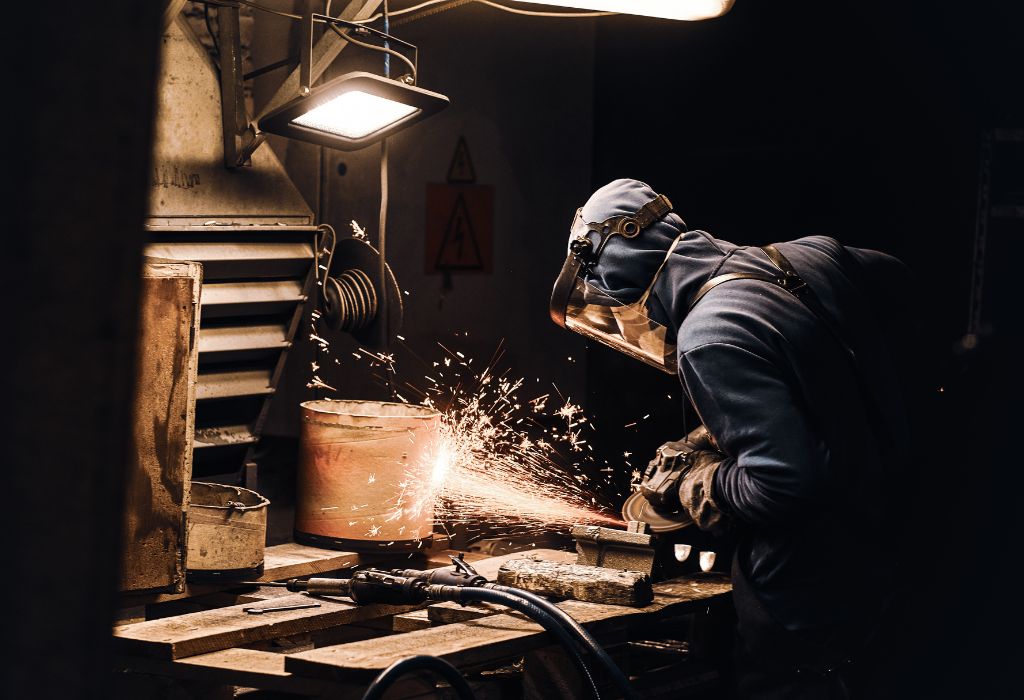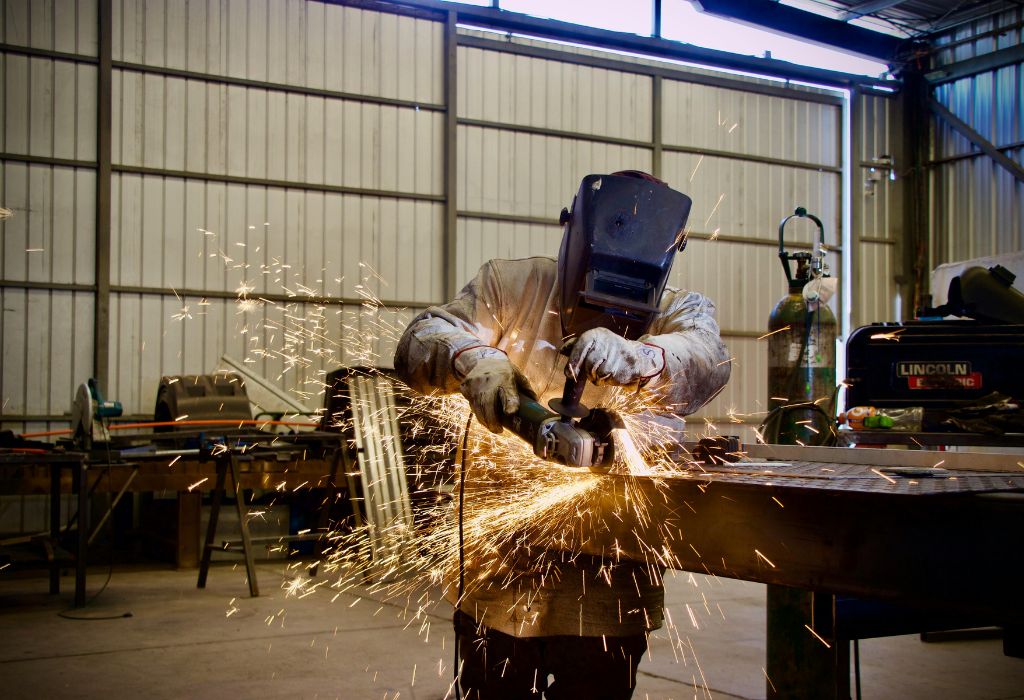Finding the right welding helmet is not just about comfort or style. It is a matter of protection, precision, and long-term safety. Every welder, whether professional or hobbyist, needs a helmet that can handle heat, light, and impact without compromise.
In this complete guide, you will learn exactly where to buy a welding helmet, what features matter most, and how to avoid low-quality or counterfeit products.
Why a Welding Helmet Is Essential

Welding arcs can reach temperatures above 10,000 °F. The ultraviolet and infrared radiation from these arcs can cause severe eye injuries within seconds. According to the Occupational Safety and Health Administration (OSHA), thousands of eye injuries occur each year because of improper protective gear. Most could have been prevented with a certified welding helmet.
A welding helmet does more than protect your eyes; it also shields your face, neck, and skin from sparks and spatter. Modern helmets with auto-darkening filters adjust instantly to light changes, providing full-time protection without the need to lift or lower the lens repeatedly.
Certified Protection Standards
When buying online, always confirm that the helmet meets the ANSI Z87.1 standard. This certification ensures the lens can resist impact, filter ultraviolet radiation, and provide consistent optical clarity.
Auto-darkening helmets are available with variable shade ranges, usually DIN 8 to 13. For MIG welding, shades between 10 and 12 are common. TIG welding may require slightly lighter shades, while stick welding needs darker filters for higher amperage.
Helmets that comply with ANSI Z87.1 continue to block harmful UV and IR rays even if the lens fails to darken automatically.
Best Places to Buy a Welding Helmet
The best place to buy a welding helmet depends on your budget, level of experience, and preferred brands. Below are the most reliable options available online.
1. Cyberweld
A trusted online welding supplier known for professional-grade equipment. Cyberweld carries major brands such as Miller, Lincoln, and ESAB. It offers free shipping on many products and handles warranty claims directly with manufacturers.
2. Baker’s Gas and Welding
An authorized distributor with excellent customer support. Baker’s Gas frequently runs promotions on helmets and bundles accessories such as lens covers or replacement batteries with select models.
3. Northern Tool
Combines online convenience with physical store locations. Their selection includes both entry-level and industrial helmets, making it a good choice for welders who want to pick up items locally.
4. Harbor Freight
Ideal for beginners or hobby welders. Recent models meet ANSI standards and feature improved optical clarity and reaction time.
5. Manufacturer Stores
Buying directly from brand websites like Miller, Lincoln Electric, or ESAB guarantees authenticity, warranty protection, and the latest product versions.
6. Amazon Industrial Supply
Amazon’s own warehouse listings are safe, but avoid third-party resellers who may not provide genuine products. Always check for “Ships from and sold by Amazon” or “Authorized dealer” labels.
Key Features to Consider Before Buying

Auto-Darkening Filter (ADF)
An ADF lens adjusts to the brightness of the arc automatically. High-end helmets darken in less than 1/25,000 second, preventing flash burns.
Sensors
Helmets use sensors to detect the arc. Two sensors are sufficient for basic use, but four or more ensure reliability during out-of-position welding.
Optical Clarity
Measured on a four-point scale (1/1/1/1 being the best), clarity affects how accurately you see the weld puddle and joint. Clearer optics reduce strain and improve precision.
Power Source
Hybrid systems with both solar assist and replaceable batteries provide the longest lifespan and consistent sensitivity.
Viewing Area
A larger window improves visibility and comfort. Look for at least 3.6 × 1.7 inches for multi-process work.
Comfort and Fit
An adjustable four-point headgear with padded bands ensures balance and reduces neck fatigue during long sessions.
Price Tiers and What to Expect
| Price Range | Ideal For | Features |
| Under $100 | Beginners | Basic auto-darkening, small viewing area, lightweight shell |
| $100 – $250 | Intermediate users | Larger window, multiple sensors, grind mode, true-color lens |
| $250 + | Professionals | Maximum clarity, advanced optics, external controls, rugged construction |
While budget models protect adequately for casual use, higher-end helmets offer superior visibility, comfort, and durability. A good helmet can last five to seven years, so consider it an investment in safety and productivity.
Fit and Ergonomics
Welding is demanding work that often requires awkward positions. A well-balanced helmet distributes weight evenly across the head and prevents neck strain.
Lighter materials like polyamide or nylon composites reduce fatigue without sacrificing protection. Replaceable sweatbands and breathable linings make long welding sessions more comfortable.
Ensure that the helmet allows space for respirators or prescription glasses if you use them. Many premium helmets also support magnifying lenses for precision TIG work.
Mistakes to Avoid When Buying Online
Skipping Certification: If the product listing does not clearly state ANSI Z87.1 compliance, avoid it.
Buying by Brand Alone: Each model has different sensor speeds, shades, and features. Focus on specifications, not just logos.
Ignoring Return Policies: Some helmets may not fit properly. Choose sellers with 30-day returns or satisfaction guarantees.
Choosing Based on Looks: A stylish design means little without proper clarity and switching performance.
Buying From Unauthorized Sellers: Counterfeit helmets often mimic branding but lack protection layers or quality control.
Forgetting Accessories: Always order spare outer lens covers and batteries along with the helmet.
Popular Models Worth Considering
Lincoln Electric Viking 3350 – Professional-grade helmet with 1/1/1/1 optical clarity, four sensors, and a large 12.5 sq-in viewing area.
Miller Digital Infinity – Wide 13 sq-in viewing window, intuitive digital controls, and strong headgear comfort.
ESAB Sentinel A50 – Sleek curved lens for enhanced vision and excellent color accuracy.
Vulcan OmniPro 220 Helmet – Affordable entry-level option with variable shade and grind mode.
All of these models are available from Cyberweld, Baker’s Gas, or Northern Tool and include full manufacturer warranties.
Common Questions About Buying Helmets
Do auto-darkening helmets protect even when not powered?
Yes. The lens material itself blocks UV and IR radiation at all times.
Can one helmet handle multiple welding processes?
Yes. Variable-shade helmets cover MIG, TIG, Stick, and even plasma cutting.
Are heavy helmets unsafe?
Not unsafe, but heavy designs increase fatigue. Always choose the lightest helmet that meets your durability needs.
Is true-color technology necessary?
It is not essential, but it improves puddle visibility and reduces eye strain during long shifts.
Can you use reading glasses or respirators underneath?
Most modern helmets allow sufficient space. Check the internal clearance specifications.
What shade do you need for plasma cutting?
DIN 8 to 10 works well, depending on amperage.
Maintaining Your Welding Helmet

Proper maintenance extends both performance and lifespan.
- Clean Lenses Regularly: Use soft microfiber cloths to remove dust and spatter.
- Replace Outer Covers: Scratched covers reduce visibility and distort light.
- Store in a Cool, Dry Place: Avoid leaving the helmet in high-heat environments or direct sunlight.
- Check Battery Life: Replace cells or recharge solar-assisted models regularly.
- Inspect Sensors: Dirt or metal dust can block detection and slow switching speed.
Routine care ensures your helmet performs safely every time you strike an arc.
Comparing Online and In-Store Purchases
Buying online gives you more variety, reviews, and pricing transparency. Authorized online retailers also handle manufacturer warranties and offer return options equal to physical stores.
In-store shopping allows you to try helmets on before purchase, which helps evaluate fit and balance. Some welders prefer to test headgear tension or lens clarity firsthand.
For most buyers, a hybrid approach works best: research models online, read verified customer reviews, and then buy from an authorized e-commerce partner that provides fast shipping and easy exchanges.
Safety Regulations and Compliance
In the United States, OSHA requires employers to provide appropriate personal protective equipment for all welding operations. Helmets that meet ANSI Z87.1 or CSA Z94.3 are considered compliant for professional use.
Always verify that the helmet includes certification markings on both the lens and the shell. This ensures it passed optical clarity, impact resistance, and UV filtering tests.
Non-compliant equipment not only endangers your eyesight but may also violate workplace safety regulations.
Final Checklist Before You Buy
- Confirm ANSI Z87.1 or CSA Z94.3 compliance
- Choose a variable shade range suitable for your processes
- Verify sensor speed and number
- Check optical clarity rating (1/1/1/1 preferred)
- Ensure headgear adjustability and padding
- Read return and warranty policies
- Purchase from authorized dealers only
Completing this checklist helps you avoid the common traps that cause buyers to regret their purchase later.
Conclusion
If you are asking yourself where can I buy a welding helmet, the answer is straightforward. Choose authorized, professional-grade retailers such as Cyberweld, Baker’s Gas, Northern Tool, or direct manufacturer stores. They provide genuine products, warranty protection, and expert support.
A high-quality welding helmet is more than a safety requirement; it is an investment in precision and comfort. Select one that fits correctly, meets safety standards, and suits the welding processes you perform most often.
Protecting your eyes is not optional. Buy once, buy right, and weld with confidence knowing your vision is secure.

I’m Darrell Julian, the founder, lead writer, and hands-on welding enthusiast behind ArcWeldingPro.com. With more than 15 years of real-world welding experience, I created this platform to share what I’ve learned in the field, in the shop, and in the heat of the arc.


